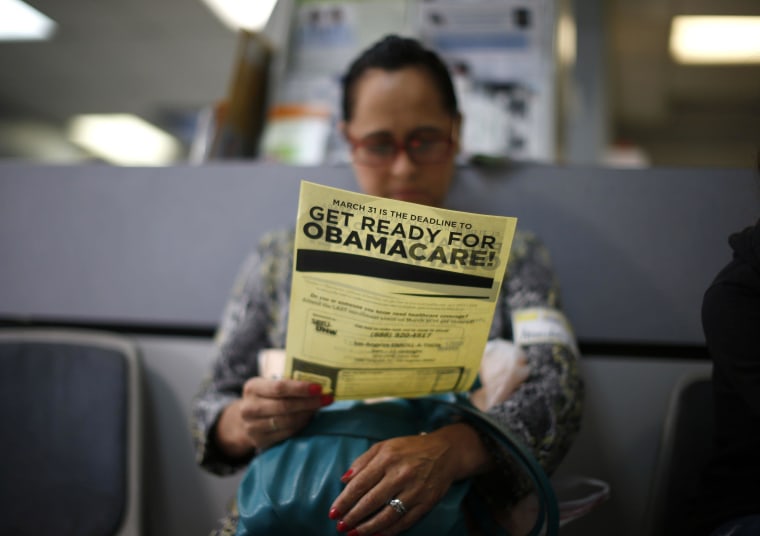Neither the Obama administration nor the states nor Congress is taking aggressive action to fix a potential problem with the Affordable Care Act, even with a Supreme Court decision looming that could raise the prices for health insurance for more than 6 million people in 34 states.
A group of conservative plaintiffs are challenging the law, arguing that the way it is written does not allow tax credits under the ACA to go to people whose states have not chosen to set up their own health care marketplaces. Only 16 states have these marketplaces, while the remainder of the states, many with either Republican-controlled legislatures or governors, have declined to create them, deferring to the marketplace run by the federal government through healthcare.gov.
The Supreme Court will hear oral arguments on this issue next week in the case King v. Burwell, with a ruling expected in June. The Obama administration is arguing the writers of the ACA clearly intended for people in all 50 states to get the subsidies, whether or not their state set up an exchange.
But for now, there is no obvious alternative if the Court rules against the administration’s position. Obama administration officials have refused to offer publicly any kind of contingency plan, arguing they are confident in their legal position and any fix to the law would require Congress anyway.
The GOP-controlled Congress, which has uniformly opposed the health care law from its inception, is not attempting to change the language in the law to make it more clearly state that people in these 34 states can get subsidies. Republicans are instead preparing plans to use a ruling against the administration in the case to force Obama to make wholesale changes to the ACA.
And at a National Governors Association meeting in Washington over the last several days, governors from both parties said they are taking a careful approach, not rushing to set up exchanges under the ACA until after they see what the Supreme Court will do.
“We don’t know what’s going to happen there. I suspect we will react,” said Utah Gov. Gary Herbert, a Republican whose state is one of the 34 without exchanges. He is the vice-chair of the NGA.
Virginia Gov. Terry McAuliffe, a Democrat whose state has also not created an exchange, said, “There’s not much we can do at this point.”
“I’m hoping that the court upholds the constitutionality,” he added.
In a closed-door meeting at the NGA on Sunday, Secretary of Health and Human Services Sylvia Burwell was pressed by governors of both parties on what the administration’s plan is if the Court rules that states must have their own exchanges in order for their citizens to get the tax credits. She declined to say, according to several of the governors, instead emphasizing her belief that the administration will win the case.
Her approach was not surprising: even conservatives concede it would be not smart for Burwell to lay out a detailed contingency plan from the administration, which might signal to the Supreme Court that Obama’s team does not believe its legal argument in the King case is sound.
But now, for the second time in three years, the Court holds the fate of Obamacare in its hands. In 2012, in a 5-4 decision, the Court upheld the controversial provision of the law that requires most Americans to purchase health insurance or face a fine. But the Court also made a key plank of the law, expanding Medicaid, voluntary instead of mandatory, as originally written. Twenty-two states, all with a GOP-controlled state legislature or governor, have declined to expand the Medicaid program, which covers people whose incomes are below $16,000.
Setting up exchanges, like Medicaid, is controversial in states. Many conservative governors and state legislators are deeply opposed to all parts of Obamacare. And setting up a health care exchange is also a huge administrative challenge. Traditionally liberal states like Maryland and Massachusetts have struggled to establish them.
Asa Hutchinson, a Republican who is the governor of Arkansas, said, “We are exploring a state exchange, but it’s simply a gleam in the eye.”
By not offering any kind of obvious solution, politicians at the national and state level are increasing the impact of a potential Supreme Court decision. Chief Justice John Roberts broke with his conservative colleagues to uphold the individual mandate in 2012, and close watchers of the Court say Roberts or Justice Anthony Kennedy could join the court’s four liberals in upholding the ability of people in those 34 states to get the subsidies.
“It concerns me greatly. If there’s a major change to the way 34 states operate because they can’t use the subsidies anymore, it could well have a dramatic effect on the law in general,” said Kentucky Gov. Steve Beshear, a Democrat whose state has set up an exchange.
If the Court rules against the administration, it appears another round of tense debate over the law will start. With millions of Americans due to lose their subsidies, Republicans are already discussing plans to use this as leverage to soften some of the requirements for health insurance plans in the ACA and give states more control over how they implement the law. President Obama is likely to be highly resistant to such changes.
‘If the Supreme Court rules in favor of the plaintiff, I believe the answer is for the Congress and the governors around the country to come together around legislation that would give states greater flexibility to craft market-based solutions on the state level,” said Indiana Gov. Mike Pence, a Republican who state does not have an exchange.
“There would be an opportunity there for the Congress and the states to really go back to the drawing board,” he added.
